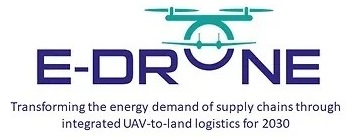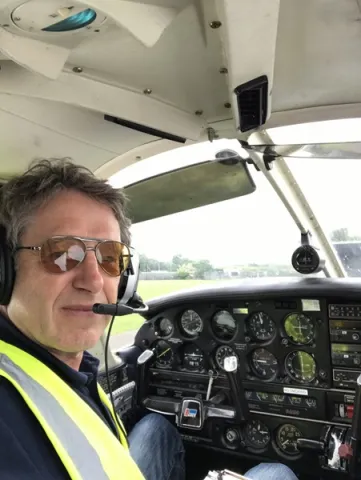Project overview
The E-Drone project examines the potential of integrated logistics solutions involving Uncrewed Aerial Vehicles (UAVs, commonly known as drones) operating alongside traditional and sustainable last-mile delivery solutions (e.g., vans, cargo cycles, walking porters).
The project uses a case study approach based on NHS patient diagnostic specimen transportation involving simulated and live trials across the Solent region.
Key research activities have included:
- Integrating crewed and uncrewed aircraft in shared airspace: Two national workshops (general aviation community and drone operators) investigated how best to share airspace equitably, with crewed and uncrewed aircraft integrated without the need for temporary segregated airspace for drones. A 4D airspace booking system was developed and trialled, which strategically deconflicts planned trajectories in a discretised airspace model where conflicts are dealt with via a simple first-come-first-serve principle.
- Quantifying the air and ground risks associated with drone operations: Ground and air risk models were developed using population density and air traffic data to allow drone operators and airspace managers to understand the risk of drone failures injuring people on the ground. A tablet game was developed that uses the models as part of a drone route planning tool where players can understand the effects on energy use of taking longer, less risky routes.
- Quantifying the potential implications of drone flight on the quality of flown medicines: Trials have been undertaken flying medicines in different types of fixed and rotary-wing drones. The results showed that there are differences in the vibration profiles of different drones and that the outer packaging system can sometimes amplify or mitigate the vibration. However, no medicines were adversely affected.
- Applying dangerous goods carriage legislation to drones: A review was published into how the current dangerous goods (DG) legislation can be interpreted and adhered to by drone operators. Project team members sat on the DG RPAS Challenge Group, contributing to the consultation on developing a regime for approving crash-protected containers (CPCs) for carrying DG by drone. The project has conducted some of the first CPC testing on medical containers.
- Using virtual reality to convey how novel transport modes might operate: The project developed virtual reality (VR) worlds, accurately replicating drones in places that are familiar to people. The VR was taken to high streets, where over 500 members of the public have experienced how drones might look and sound in the absence of direct experience.
- Using serious games to further debate and understanding about future new transport systems: The project developed a novel board game that enables players to reflect on the use of delivery drones, providing an effective tool for undertaking focus group activities and for stakeholder engagement.
Further information is available on the project website.

Staff
Lead researchers
Other researchers
Collaborating research institutes, centres and groups
Research outputs
Andy Oakey, Toni Martinez-Sykora & Tom Cherrett,
2024, Multimodal Transportation, 3(4)
Type: article
Matt Grote, Andrew Oakey, Aliaksei Pilko, Jakub Krol, Alexander Blakesley, Tom Cherrett, James Scanlan, Bani Anvari & Antonio Martinez-Sykora,
2024, Transport Economics and Management, 2, 58-75
Type: article
Andy Oakey, Toni Martinez-Sykora & Thomas Cherrett,
2023, Computers and Operations Research, 157
Type: article
Matt Grote, Thomas Cherrett, Andy Oakey, Antonio Martinez-Sykora & Ismail Aydemir,
2023, Future Transportation, 3(1), 169–188
Type: article
Wanqing Zhu, Andy Oakey, Paul Royall, Tim Waters, Thomas Cherrett, Katherine Theobald, Ans-Mari Bester & Robert Lucas,
2023, PLoS ONE, 18(1 January)
Type: article


